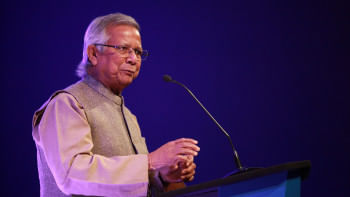Strategic approaches to mitigate rumours in Bangladesh

In recent weeks, Bangladesh has been swept up in a wave of rumours circulating across social media. These rumours have thrived, particularly during disruptions in internet and communication services. Scholars studying social media-based rumours note that such rumours often spread during crises, wars, periods of uncertainty, and disasters. This is especially relevant to Bangladesh now.
Ongoing disruptions in communication create an information vacuum, preventing access to reliable sources. This increases uncertainty and fear, making people more susceptible to believing and spreading unverified information. Additionally, the human tendency to seek and share information intensifies during crises and disasters. Rumours fill the gap without credible channels, often appearing plausible and contextually relevant. The current situation, marked by ineffective communication, heightened anxiety and uncertainty, and a lack of trustworthy information channels, provides fertile ground for rumours to flourish.
In such a situation, it is nearly impossible to stop rumours completely, but they can be effectively prevented with proper and timely measures. Like cyclones or wildfires, rumours can be tracked and understood as they develop, but they can cause significant harm without timely intervention. Therefore, the continuous generation of rumours underscores the need for prevention through immediate, mid-term, and long-term preventative strategies.
Credible channels must immediately disseminate as much truth as possible regarding relevant issues to counteract rumours. Researchers have not found a single example of how stopping communication systems and hiding the truth helped prevent rumours. Therefore, immediately restoring all communication channels to normal functioning is urgent. Bangladesh Awami League's Facebook page is trying to counteract rumours. Unfortunately, this may not be effective due to potential distrust from a significant portion of the population on the platform now. A good combination of content, context, and communication medium is not only important but vital in combating rumours.
In this given country's current infrastructure, the government needs to collaborate with fact-checking organisations like Rumour Scanner and Jachai immediately. These organisations identify and debunk rumours and provide factual information as proof of their claims, which have earned public trust already. The government can utilise this trust to mitigate the situation. The credibility of the source plays a crucial role in public perception. Hence, nationally respected newspapers, television channels, and radio stations should also broadcast accurate information to counter false narratives. As part of immediate action, government entities should also work closely with social media companies to flag and remove rumours quickly. Despite various social media platforms earning substantial revenue from Bangladesh, they do not have offices in the country. As a mid-term action, the government should pressure these companies to establish local offices in Dhaka to ensure an immediate response during crises from them. In addition, my ongoing study found that most rumours circulated from fake or unverified Facebook accounts in Bangladesh over the last decade. The government should pressure these companies to enforce identity verification for account creation and operation, which is feasible for them.
Engaging community leaders and influencers who sway public opinion can also help spread accurate information. These individuals must be well-accepted and respected in society. Additionally, educating the public on identifying and verifying information can empower individuals to assess online content critically. Short-term digital literacy campaigns and social media-based advertisements, including public service announcements and educational programs, can effectively raise awareness and work as mid-term policies.
Addressing rumours requires more than immediate and mid-term action; it demands a sustainable, long-term approach. Rumours have existed throughout history and will continue to spread in the future. Historically, their impact was limited due to slower dissemination. As a long-term measure, the government could establish a dedicated rumour monitoring and detection cell equipped with the necessary resources to monitor and debunk rumours in real time. This institution must operate transparently and effectively to gain and maintain public trust. A unit currently works under the Ministry of Information and Broadcasting but fails to perform its duties effectively. Proper restructuring and support are essential to creating a trustworthy and efficient rumour management system. Besides, enhancing the nation's cybersecurity infrastructure can also prevent malicious actors from spreading false information. Investing in advanced technology and skilled personnel will safeguard digital communication channels. Long-term partnerships with traditional and new media organisations can also ensure accurate information flow. Regular training and workshops for journalists on responsible reporting and fact-checking can maintain high information dissemination standards. The Press Institute of Bangladesh and other NGOs could be key in training local journalists on fact-checking.
Moreover, building and maintaining public trust is crucial for any rumour prevention strategy to be effective. Transparency in government operations and consistent communication foster a sense of trust and reliability. Public feedback mechanisms should be established to allow citizens to voice their concerns and verify information directly with authorities.
Implementing a comprehensive digital literacy program as part of the national education curriculum can prepare future generations to navigate the digital landscape responsibly. This program should cover critical thinking, media literacy, and online safety topics. Though some changes have been made recently, they are not enough and effective. Similarly, universities and research institutions should be encouraged to study rumour spread patterns and develop new tools and strategies for combating rumour. Different countries have developed tools for combating rumours, which are also helping them. Updating laws and regulations to address the spreading of false information is also essential. However, care must be taken to balance regulatory measures with protecting free speech and civil liberties. Moreover, developing comprehensive crisis communication plans that can be activated during an emergency will ensure accurate information is quickly disseminated.
The proliferation of rumours in Bangladesh is a multifaceted issue that requires a strategic, well-coordinated government response. The government can effectively counter the rumours by adopting immediate, mid-term actions and long-term strategies. Ensuring the dissemination of accurate information in credible ways, building public trust, and fostering a culture of digital literacy are key components of this effort.
Asaduzzaman Kajol is a PhD candidate at the University of Queensland, Australia, studying social media-based rumour.
Views expressed in this article are the author's own.
Follow The Daily Star Opinion on Facebook for the latest opinions, commentaries and analyses by experts and professionals. To contribute your article or letter to The Daily Star Opinion, see our guidelines for submission.

 For all latest news, follow The Daily Star's Google News channel.
For all latest news, follow The Daily Star's Google News channel. 












Comments